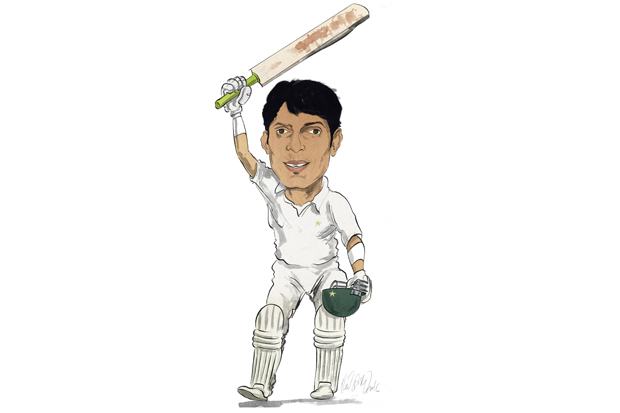There have been three great captains of Pakistan. The first was A.H. Kardar, the country’s first Test captain. Born in Lahore, and talent-spotted by the senior Nawab of Pataudi, Kardar played for India before Partition. He led Pakistan to victory over India in its second-ever Test match in Lucknow in 1952, and even more famously over England at the Oval Test in August 1954. Uniquely, Kardar won at least one Test match in Pakistan’s inaugural series against each other country.
Pakistan’s next great captain was Imran Khan, the all-rounder who inspired his country to a famous World Cup victory in 1992, and now has honourable aspirations to become Pakistan’s prime minister.
The third is Misbah-ul-Haq, and he has a claim to be the greatest. On statistics alone his claim is indisputable: 20 wins in 42 Tests as captain. Imran had 14 wins in 48 Tests, Kardar six in 23.
But most importantly, Misbah became captain in the wake of two disasters. The first was the terrorist attack on the Sri Lankan team bus at Lahore in 2009. This incident immediately condemned Pakistan to international isolation. No Test side has visited Pakistan since. Pakistan’s international players have been condemned to a perpetual shuttle between foreign hotel rooms, cut off from extended family and community networks which count for so much in Pakistan. So-called ‘home’ matches are played in the UAE, in echoing deserted stadiums.
The second calamity took place the following year when the Pakistan team toured England. Three of its players, including the captain, Salman Butt, and its brilliant young opening bowler, Mohammad Amir, were entrapped by the News of the World. The team was disgraced and the three players involved were later sent to jail.
At that dark hour, there was reason to doubt the survival of Pakistan cricket. That was when Misbah took over. He was not an obvious choice as captain. He had a mixed Test record, and was not even selected for the 2010 Tour, nor the one before in 2006. He was already 36 — ancient for a modern player.
Yet he proved an inspired choice. He had exactly the right qualities to lead his team at its moment of supreme crisis. He has not only anchored the batting time and time again but given his team a mental and moral example.
In both tasks he has been magnificently supported by his lieutenant Younus Khan, now Pakistan’s highest-scoring Test batsman, although the two men are very different on and off the pitch. Younus is voluble and extrovert and always seems on the move; Misbah is calm and cerebral, measured in speech and motion. They do share an intense patriotism and devotion to their families.
Misbah-ul-Haq was raised in Mianwali, in Khyber Pakhtunkhwa (formerly North West Frontier province). He is related to Imran Khan’s father and a member of the same Niazi clan. Both his parents were educators and made him give academic work priority over cricket. He gained an MBA at the University of Management and Technology in Lahore, a qualification which makes him one of the best-educated cricketers in the modern era. His studies of leadership skills and human resource management delayed his entry to the first-class game until he was 24, but have been of lasting value to him as captain.
He is one of those rare cricketers whose Test performance has been massively enhanced by the duties of captaincy. Before 2010, Misbah had scored 1,008 runs in 33 Tests at an average of 33.60. Since becoming Captain, he has scored a further 3,344 runs in 42 Tests, at an average of 56.68.
‘Responsibility,’ Misbah told us, ‘has always given me a lot of confidence to face the music and perform.’
As a Test captain, Misbah has the priceless gift of looking as though he always has a plan on the field. In fact, he usually does. He has gained victories with an inexperienced attack since the loss of his former matchwinner, the spinner Saeed Ajmal, with a suspect action. When he led Pakistan to a 2 - 0 victory over England last winter in the UAE, none of his bowlers had taken 100 Test wickets.
Misbah is now 42. Assuming he captains in the fourth Test at the Oval he will be the oldest Test captain since the mighty Warwick Armstrong of Australia in 1921. He is barely half Armstrong’s 22 stone in weight: he and Younus (aged 38) are reputedly the fittest players in the Pakistan party.
Like his predecessors, Misbah has had clashes with selectors, adminstrators, media and fellow players. His undemonstrative style has sometimes made him undervalued in his own country. However, he commands a personal authority to match Khan, Steve Waugh for Australia or even Sir Frank Worrell in the West Indies.
Again with Younus’s help he should get the best from an exciting Pakistan line-up. Misbah’s most difficult task is to guide Mohammad Amir, still only in his rehabilitation, back into Test cricket. If he succeeds, Amir and his partner, Wahab Riaz, could become one of the best left-arm opening attacks in cricket history.
The other bowling priority will be the legspinner Yasir Shah, returning after a three-month drugs ban, who on his day is a magician to match his predecessors Abdul Qadir and Mushtaq Ahmed. Pakistan’s batting is sketchy. However, Misbah will hope that the strokemakers Mohammad Hafeez, Shan Masood, Azhar Ali, Asad Shafiq and the bouncy wicketkeeper Sarfraz Ahmed can take the strain from himself and Younus.
Misbah and his team will enjoy far more support from British Asian cricket lovers than in their ‘home’ Tests in the UAE. This great man is coming to the end of his career and deserves a farewell to match Don Bradman’s at the Oval 1948. His achievement has been epic. Like Bradman, he has been far more than a simple cricketer. For his six years at the helm of the national team, Misbah has helped to bind Pakistan together as a nation.
The post Pakistan’s great leader appeared first on The Spectator.
Got something to add? Join the discussion and comment below.
Get 10 issues for just $10
Subscribe to The Spectator Australia today for the next 10 magazine issues, plus full online access, for just $10.
You might disagree with half of it, but you’ll enjoy reading all of it. Try your first month for free, then just $2 a week for the remainder of your first year.














Comments
Don't miss out
Join the conversation with other Spectator Australia readers. Subscribe to leave a comment.
SUBSCRIBEAlready a subscriber? Log in